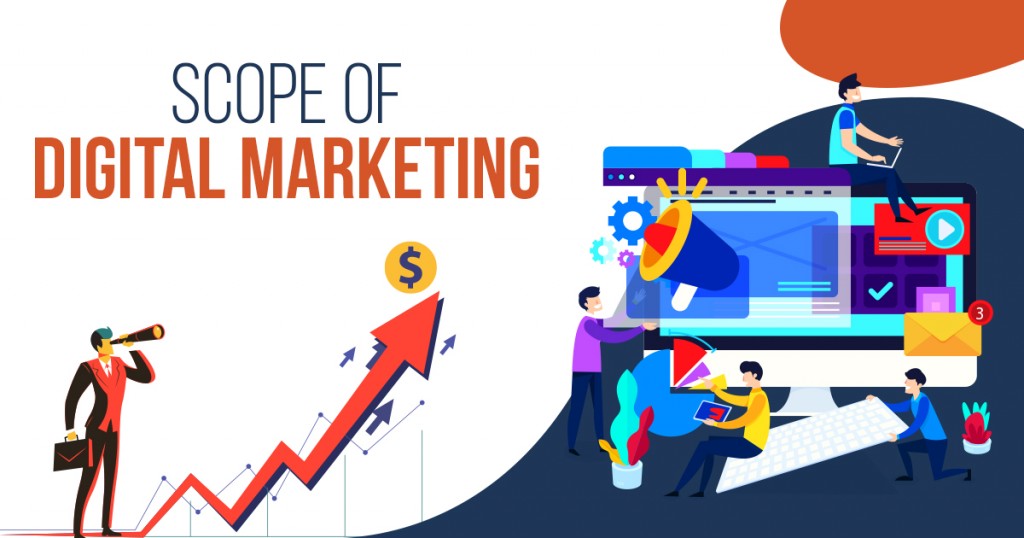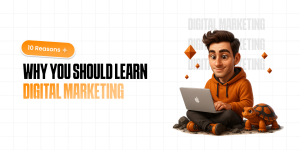1. Introduction to Digital Marketing
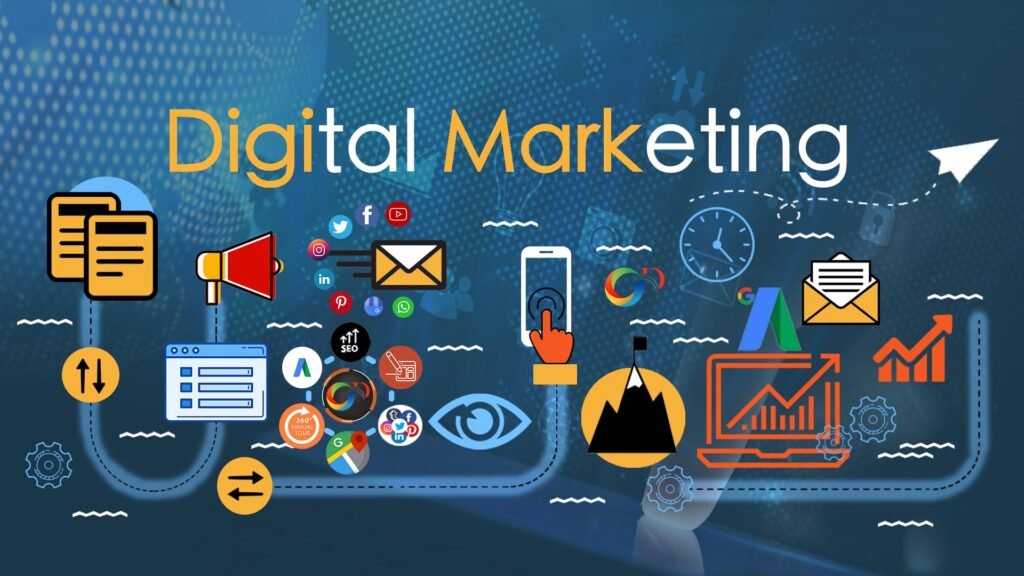
In the modern business landscape, digital marketing has transformed from a peripheral tactic into a core strategic pillar for organisations of all sizes. As consumers spend more time online, and as technology enables richer interaction, the reach, influence and potential of digital marketing continue to expand. This post explores the breadth and depth of the marketing—why it matters, how it is evolving, and where opportunities lie.
2. Why the Scope of Digital Marketing Has Expanded
Several converging factors have increased the marketing dramatically in recent years:

- Internet & smartphone penetration: More people than ever are digitally connected, meaning businesses can reach audiences across geographies, devices and platforms. For example, in India, internet penetration and usage is growing strongly. Altera Institute+1
- Changing consumer behaviour: Consumers now research, compare, buy, review and recommend online. With this shift, the role of digital marketing is no longer optional—it is fundamental. Simplilearn.com+1
- Cost-effectiveness & measurement: Digital marketing allows targeting, segmentation, measurement and adjustment in ways that traditional media cannot match. This flexibility expands the scope of what is possible. Young Urban Project+1
- Global reach & scalability: Acampaign can go global, and can scale up or down more easily than traditional campaigns. This increases its scope from local to international markets.
- Technology & data: With data analytics, automation, AI and other tools, digital marketing becomes more efficient, dynamic and personalised—pushing the scope into new terrains. DigiMarCon+1
Because of these drivers, discussing the “scope ” means not only what it currently covers, but also what it can cover in the near future.
3. Key Areas
When we talk about today, we’re covering a broad range of channels, tactics and strategies. Some of the major areas include:
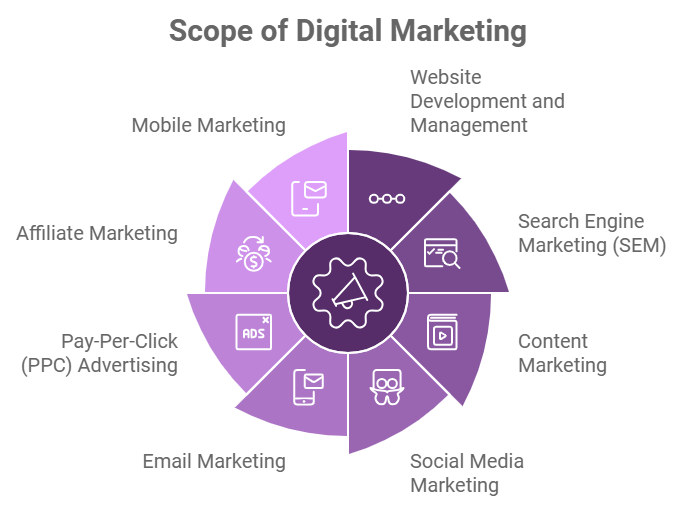
- Search Engine Optimisation (SEO): Ensuring that a brand or product is visible when people search online.
- Search Engine Marketing (SEM) / Paid Advertising: Using paid channels (e.g., Google Ads) to reach target audiences.
- Content Marketing: Creating engaging, relevant content (blogs, videos, podcasts) to attract and retain audiences.
- Social Media Marketing: Leveraging platforms like Facebook, Instagram, LinkedIn, TikTok for brand building, engagement and conversions.
- Email Marketing & Automation: Using email lists, automated workflows and personalisation to nurture leads and build loyalty.
- Affiliate Marketing & Influencer Marketing: Working with partners or influencers to expand reach.
- Mobile Marketing: Given the dominance of mobile devices, marketing via apps, mobile-web, location-based services.
- Data & Analytics: Measuring, analysing, optimising. The ability to track results and adjust campaigns in real-time is a hallmark of digital marketing.
- Emerging Channels: Voice search optimisation, AR/VR campaigns, AI-driven personalisation, interactive media. Triangle Direct Media+1
Thus, the scope of digital marketing covers both the “classic” tactics and the frontier technologies. It’s dynamic.
4. Market and Industry Opportunities
From a business‐perspective, the scope translates into opportunities across industries, geographies and business models.

- Industry penetration: Whether e-commerce, EdTech, healthcare, finance or even NGOs, most sectors are now investing in this field. For example, reports show that globally and in India these sectors are growing rapidly. Kpidm+1
- Career opportunities: For professionals,it means a wide variety of roles—SEO specialist, content strategist, social media manager, data analyst, paid ad expert, digital marketing manager. digitalregenesys.com+1
- Regional growth: Emerging markets, including India, are seeing strong growth in digital marketing budgets and adoption. For instance, one article cites India’s digital marketing market size and growth drivers. Altera Institute
- Start-ups & SMEs: Smaller businesses can leverage digital marketing more cost-effectively than many traditional routes, enabling a broader base of players.
- Global outreach & remote work: Digital marketing skills are portable—professionals can service clients globally, and businesses can target global markets.
Given all these, the scope of digital marketing for business growth, professional advancement and market expansion is very strong.
5. Future Trends Expanding the Scope of Digital Marketing
To understand how far the scope will extend, we must look at emerging trends:

- Artificial Intelligence & Automation: From predictive analytics to chatbots to programmatic advertising, AI is enabling smarter digital marketing. DigiMarCon+1
- Voice Search & Conversational Marketing: As users adopt voice assistants, marketers must adapt to new queries, formats and platforms. dazonn.com
- Augmented Reality (AR) & Virtual Reality (VR): Brands are using immersive experiences to engage audiences—another expansion of digital marketing’s scope. Dypatil Online+1
- Short-form Video & Interactive Content: Platforms like TikTok, Instagram Reels, YouTube Shorts drive attention; marketers must incorporate these. dazonn.com
- Personalisation & Big Data: Consumers expect more personal, relevant experiences; digital marketing can deliver that via data. Dypatil Online+1
- Privacy & Ethical Marketing: As data regulation tightens, digital marketing must evolve with ethics and user trust in mind. Forbes
- Multi-channel / Omni-channel Integration: The scope extends to connecting online and offline experiences, cross-device and platform consistency. Simplilearn.com
These trends mean the scope of digital marketing is not static—it keeps widening and deepening.
6. Benefits and Value Proposition
What makes the scope of digital marketing valuable? Why should organisations invest in it?
- Measurable results & RO I It offers analytics and tracking—businesses can see what’s working and adjust. dazonn.com+1
- Targeting and segmentation: You can reach specific audiences by behaviour, demographics, interests — making campaigns more efficient. Kpidm
- Flexibility & adaptability: Campaigns can be launched, modified or paused quickly—allowing agility in changing markets. Web and Crafts+1
- Cost‐effectiveness: Digital marketing often needs lower budgets compared to large broadcast campaigns, and cost per acquisition can be lower.
- Global reach: The internet knows no geography—brands can access new markets and niche segments.
- Engagement & brand building: Unlike one-way traditional ads, digital marketing enables two-way communication—social media, reviews, feedback channels. Young Urban Project
Thus, the scope of digital marketing delivers tangible value across many dimensions.
7. Challenges within the Scope of Digital Marketing
Even with the broad scope, there are challenges that organisations and professionals must navigate:
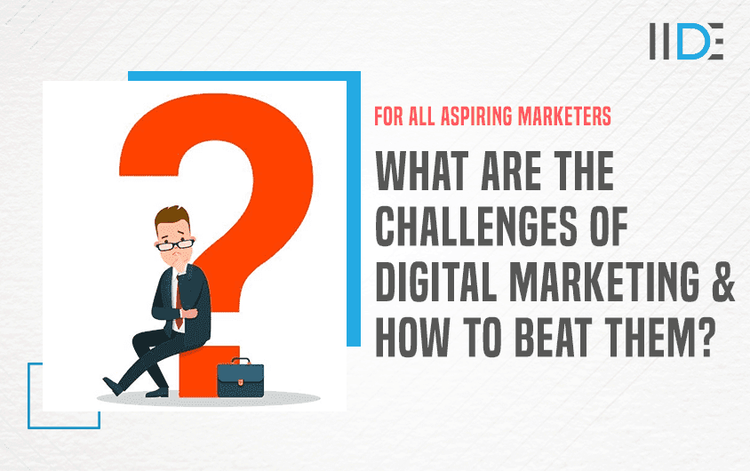
- Rapid pace of change: Platforms change algorithms, new technologies emerge—what worked yesterday may not work tomorrow. dazonn.com+1
- Content saturation: With so many brands creating content, standing out becomes harder.
- Skills gap: To exploit the full scope of digital marketing, you need skills in analytics, tech, creativity, platforms—and that can be a barrier. Pacific Link College – PLC
- Privacy & regulation: As data usage tightens, digital marketers must comply and adapt, which adds complexity. Forbes
- Attribution and measurement issues: While digital is measurable, attribution across channels (online-offline, multi-device) is still tricky.
- Integration with traditional marketing: For many organisations, aligning with legacy channels is a challenge.
Despite these, the scope remains compelling—provided these challenges are addressed strategically.
8. How to Harness the Scope of Digital Marketing: Strategic Considerations
For businesses (or individuals) wishing to leverage the full scope, here are key strategic considerations:
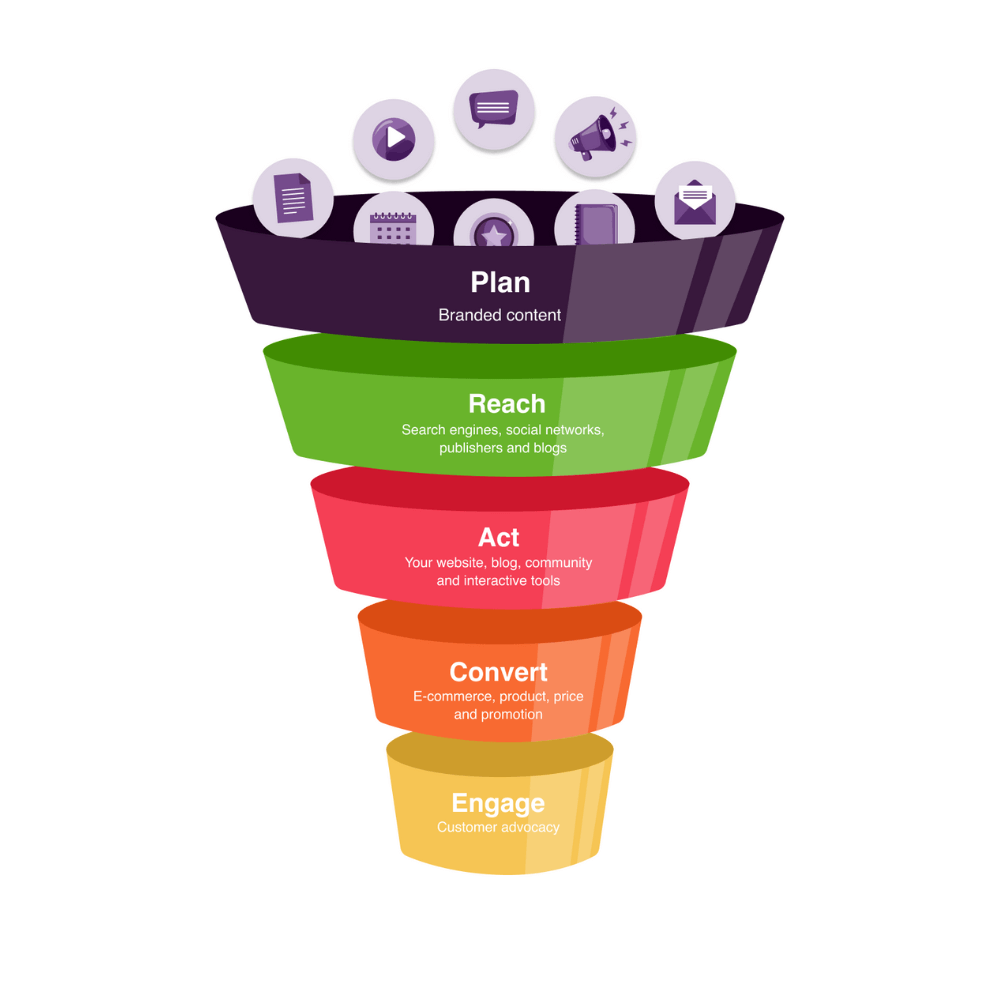
- Define clear goals & KPIs: Whether it’s brand awareness, lead generation, sales, loyalty—tie your digital marketing efforts to measurable outcomes.
- Know your audience intimately: Use data, analytics, personas, and behaviour insights—digital marketing’s scope is maximised when contextually aligned.
- Select right channels & mix: The scope isn’t about all channels; it’s about right channels for your audience and objectives.
- Allocate proper resources & skills: Build or outsource capabilities in content creation, analytics, digital ad tech, SEO etc.
- Focus on data & optimisation: Use analytics to iteratively improve—given digital marketing’s scope includes real-time adjustment and optimisation.
- Stay agile & future-aware: Incorporate emerging technologies (AI, voice, AR) when appropriate, keep testing, keep learning.
- Ensure integration: Connect with offline touchpoints, CRM, sales funnels, and traditional channels—to exploit full scope of omni-channel reach.
- Prioritise user experience & trust: Given consumer expectations, it must be user-centric, transparent and ethical.
- Measure and attribute properly: Use tools to attribute value across channels and devices; keep refining your approach.
By doing this, organisations can truly leverage the broad and expanding scope of digital marketing.
9. Case Studies & Real-World Applications

While detailed case studies are beyond the scope of this post, it’s useful to highlight realised in practice:
- E-commerce brands: Many e-commerce companies use digital marketing to drive traffic via SEO, retargeting ads, social media, influencer partnerships and conversion optimisation. The scope covers full funnel—from awareness to purchase to loyalty.
- B2B companies: Even B2B firms leverage digital marketing now—using content marketing, webinars, LinkedIn, account-based marketing, lead nurturing via email automation. In short, the scope includes lead generation, education, and complex purchase cycles. Altera Institute+1
- Local businesses: Small local shops or service providers use local SEO, Google My Business, social media, reviews and mobile advertising—a subset of digital marketing’s scope tailored to locality.
- Global brands: Big global players integrate digital marketing across markets, languages, platforms, analytics and data systems—exploiting the full global scope.
- Emerging formats: Some brands are already using AR/VR experiential campaigns, interactive content, voice-search optimisation—pushing the frontier of digital marketing’s scope. Triangle Direct Media+1
These illustrate that the scope of digital marketing is not just theoretical—it’s being deployed across business types and geographies.
10. Conclusion: The Expanding Horizon of Digital Marketing
In concluding, the concept is vast and still growing. From traditional online channels like SEO and social media to frontier technologies like AI, voice, AR and immersive experiences,it spans a wide canvas. For organisations, staying ahead means recognising this expansive scope and strategically aligning to it. For professionals, the scope offers choice, growth and creativity. And for anyone venturing into this field, understanding the breadth—what this scope encompasses—is key.
If you embrace the full scope —from foundational tactics to emerging capabilities—you position yourself (or your business) for the next wave of growth and innovation.++++If you interested for such knowledge , go to our page
